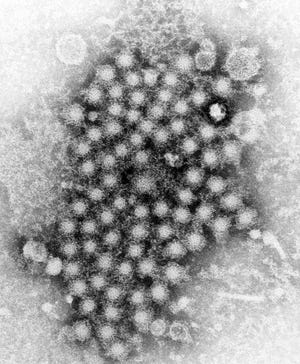Two Michigan children had suspected cases of a rare, severe form of hepatitis that’s now believed to have sickened at least 109 kids in the U.S. and may be linked to adenovirus infection.
Both Michigan children were younger than 5. One was from Oakland County and the other from the city of Detroit, said Lynn Sutfin, a spokesperson for the state health department.
One child was sickened in October, Sutfin said; she couldn’t provide details about the timing of the second suspected Michigan case.

More:Free, reduced-cost school meals to continue for eligible Michigan families
More:For kids with autism, getting the COVID-19 vaccine isn’t as simple as a shot in the arm
The U.S. Centers for Disease Control and Prevention is investigating both cases as part of a national look at this mysterious acute form of hepatitis, searching for clues.
Of the American children whose cases are under investigation, 90% were hospitalized and 14% needed liver transplants, Dr. Jay Butler, the CDC’s deputy director for infectious diseases, said during a Friday news conference.
“Fifteen days ago, CDC issued a nationwide health alert to notify clinicians and public health authorities about an investigation involving nine children in Alabama identified between October of 2021 and February of 2022 with hepatitis or inflammation of the liver and adenovirus infection,” Butler said.
“All of these patients were previously healthy, came from different parts of the state and were hospitalized with significant liver injury without a known cause, including some with acute liver failure.
“All nine ultimately tested positive for adenovirus, which is a common virus that typically causes mild cold or flu like symptoms, or stomach and intestinal problems.”
Since the CDC issued the health alert, more possible cases were identified in the U.S., Butler said, in children living in 24 states and one U.S. territory.
As of Friday, cases were under investigation in Alabama, Arizona, California, Colorado, Delaware, Florida, Georgia, Idaho, Illinois, Indiana, Louisiana, Michigan, Minnesota, Missouri, North Carolina, North Dakota, Nebraska, New York, Ohio, Pennsylvania, Puerto Rico, Tennessee, Texas, Washington, Wisconsin.

More:COVID-19 cases in Michigan expected to climb through May: What it means
More:Michigan is the ‘worst state’ for children with dyslexia, lawmaker says
Hundreds of similar cases also have been identified in the United Kingdom, Northern Ireland, Spain, Denmark, Romania, Norway, France, Italy, Belgium, the Netherlands and Israel, according to the World Health Organization.
Some of the children who developed this severe form of hepatitis also have a strain of adenovirus known as adenovirus 41, which can cause vomiting and diarrhea along with respiratory symptoms.
“Some of the common causes of viral hepatitis such as hepatitis A, B, C, delta and E have been considered and tested, but not found in any of these cases,” Butler said. “In addition, none of the nine children in Alabama had COVID-19 infection during their hospitalization or a documented history of COVID-19.”
None of the children had gotten COVID-19 vaccines, either, he said, prior to being hospitalized for hepatitis. The average age of the infected children was 2 years old.
“Adenovirus has been detected in some of the children, but we don’t know if it is the actual cause of these illnesses,” Butler said. “Among 109 patients currently under investigation, more than half have evidence of an adenovirus infection. In addition, adenovirus has been detected in many, but not all, of the cases occurring outside of the United States.”
Other factors also are being considered, such as environmental exposures, medications and other infections children might have had prior to getting sick, he said.
CDC is issuing new guidance for doctors to step up adenovirus testing and reporting possible cases of hepatitis with no known cause in children.
“Because we’re still investigating the possible link between adenovirus infection and the hepatitis we are also recommending the clinicians evaluate these patients and consider testing for adenovirus.”
And though this illness is extremely rare, Butler urged parents and caregivers to be aware of hepatitis symptoms, which can include:
- Vomiting
- Dark urine
- Light-colored stools
- Jaundice, or yellowing of the skin
The majority of the children who have developed this condition have fully recovered, said Dr. Umesh Parashar, chief of the viral gastroenteritis branch in the division of viral diseases at CDC.
Adenovirus can be spread by droplets when a person coughs or sneezes and also through fecal-oral transmission, Parashar said.
“We truly don’t know if it is the cause of illness,” Parashar said of adenovirus. “We are going to look at it in a very broad way.”
Among the questions are whether underlying immune conditions in the children who develop this disease could play a role or whether prior coronavirus exposure might have affected the way adenovirus manifested in those children, he said.
“There might be some change in the virus itself and we will only know that after some of the whole genome sequencing studies … are completed,” Parashar said.
“We’re certainly keeping an open mind to that and looking at drugs, toxins, other environmental exposures, or other pathogens.
“It’s still early days in terms of pinpointing the cause and understanding the mechanism of illness in these children.”
Contact Kristen Jordan Shamus: kshamus@freepress.com. Follow her on Twitter @kristenshamus.